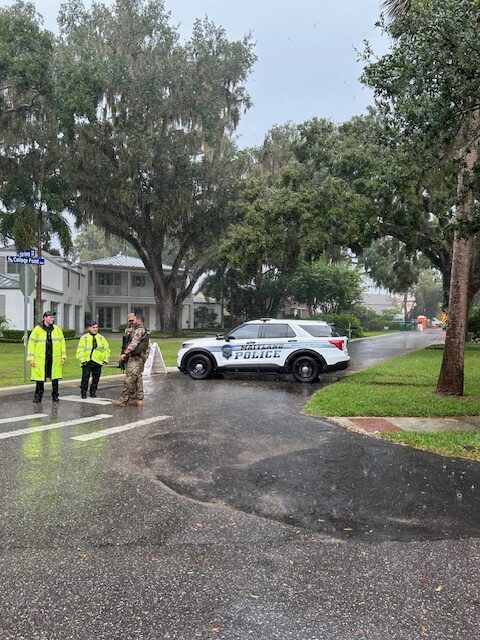
by Beth Kassab | Sep 25, 2024 | Election, News, Uncategorized
J.D. Vance fundraiser at home of Golden Corral franchisee shut down residential streets
The campaign event also prompted heavy police presence in the neighborhood around Lake Virginia
Sept. 25, 2024
By Beth Kassab
A fundraiser reportedly featuring J.D. Vance at the home of Eric and Diane Holm shut down residential streets off Lake Virginia on Wednesday afternoon as rain started falling head of Hurricane Helene’s projected landfall in the panhandle.
Police from Winter Park and Maitland as well as Orange County deputies patrolled the area, including by boat. From across Lake Virginia, white tents could be seen in the backyard of the nearly 10,000-square-foot residence that belongs to major franchisees of Golden Corral and other businesses.

The home of Eric and Diane Holm. (Orange County Property Appraiser’s Office)
The Holms were listed on a flyer posted on social media by Rep. Anna Eskamani for the lunch event (no word on whether it included an all-you-can-eat buffet or a chocolate fountain) as part of the event’s host committee. The flyer for the Trump campaign event featuring the vice presidential candidate also listed as “hosts:” Rep. Aaron Bean; Agriculture Commissioner Wilton Simpson; Rep. Kat Cammack; Chief Financial Officer Jimmy Patronis; Rep. Michael Waltz; Ricky Caplin and Nancy McGowan.
Seats started at $5,000 per couple, according to the flyer, all the way up to $100,000 per couple.
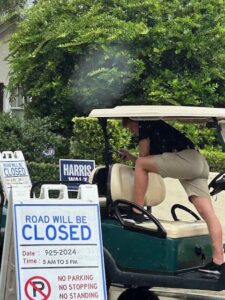
A Harris sign peeks out from a front yard near a fundraiser that reportedly featured J.D. Vance on Wednesday afternoon.
At least one house on a closed stretch of road near the event had a “Harris/Walz” sign in the front yard that was obscured by what appeared to be valet golf carts.
The Holms have hosted a number of charity events at their home, which features a room dedicated to their English Bulldog with a custom carrousel style bed, according to a 2019 story in Winter Park Magazine.
Holm is also known for his charitable work, including a Thanksgiving dinner for more than 20,000 at the Salvation Army in Orlando known as “Helpings from the Heart.”
WinterParkVoiceEditor@gmail.com
To comment or read comments from others, click here →
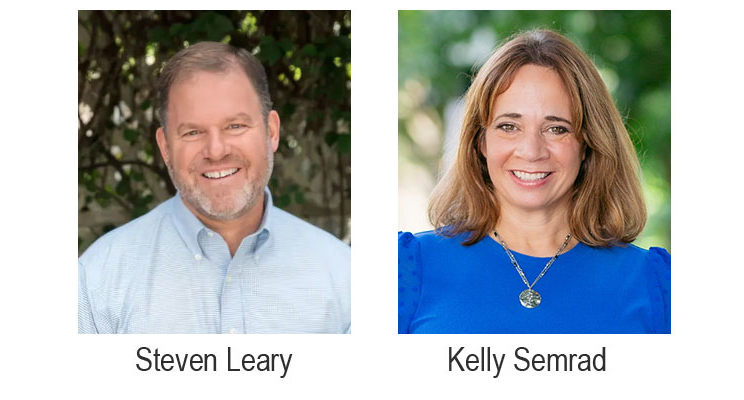
by Beth Kassab | Sep 22, 2024 | Election, News, Uncategorized
Text poll appears to test possible attacks in District 5 County Commission race
Steve Leary and Kelly Semrad will face off on the Nov. 5 ballot for the district that includes Winter Park
Sept. 23, 2024
By Beth Kassab
Somebody is testing potential attack ads against Kelly Semrad, the candidate who finished first in last month’s primary election for Orange County Commission District 5.
A poll received earlier this month by voters in the district asked multiple questions evaluating possible lines of attack against Semrad – while also testing positive messages for Steve Leary, the former Winter Park mayor who finished second in last month’s primary and now faces a one-on-one runoff with Semrad on the Nov. 5 ballot.
The poll could be a preview of last-minute attacks ads that could surface in the closing weeks or days of the campaign, whether from Leary’s campaign itself or surrogates such as Orlando Mayor Buddy Dyer or the Florida Realtors lobbying group, both of which paid for ads helping Leary during last month’s primary.
Semrad, a UCF professor, and Leary are vying for one of three seats up for election this year that will shape the makeup of the Orange County Commission at a time when developers are seeking permission to transform vast rural areas into subdivisions.
The poll stated clear falsehoods about Semrad such as “Kelly Semrad has no plans to protect Orange County’s environment and natural areas from urban sprawl.”
In reality, Semrad is an outspoken advocate for two referendums that will also appear on the November ballot. The first asks voters to designate a rural boundary in the county and the second would give the County Commission the power to stop potential developers from voluntarily annexing their land into other jurisdictions such as the city of Orlando.
The rural boundary and annexations have emerged as key issues in the District 5 race as well as the contests in districts 1 and 3. Leary has said he supports establishing the rural boundary, but has not answered a question that would give the rural boundary measure its teeth: Whether he supports the move to allow the county commission to block annexations by the cities.
The same poll question stated that Semrad’s “husband works for the largest developers in Central Florida helping to prep land by clearing trees, destroying natural habitats and erasing rural and agricultural lands, all to make way for more sprawl neighborhoods. How convincing is that statement as a reason to vote against Kelly Semrad?”
Semrad said her life partner (they aren’t married) is an engineer who works in construction, but considered the statement to be a mischaracterization of his work that she said focuses on roads and urban redevelopment.
His firm’s website lists Universal Orlando, Tavistock and major homebuilders among its clients — the same companies that have contributed heavily to Leary’s campaign fund and political action committee. So, using the same logic, the poll question also appears to suggest those companies participate in “destroying natural habitats and erasing rural and agricultural lands, all to make way for more sprawl neighborhoods.”
Leary and his campaign did not respond to multiple calls and emails seeking comment for this story.
It’s unclear who paid for the survey, which was sent by company called Research Polls that lists its address as a canal-front condominium in downtown Fort Lauderdale. When this reporter went to website linked in the text message for the poll, the page said, “Share your opinions on Orange County” followed by, “Thank you for your interest in this survey. The survey is now closed.”
The survey also attempted to question Semrad’s credibility on one of her central platforms — pushing the county to diversify how it spends the Tourism Development Tax, a levy collected on hotel beds, beyond projects backed by the industry.
“Kelly Semrad claims to be a tourism expert, but she’s never worked in the industry. If she misrepresents her own background, she can’t be trusted to represent Orange County. How convincing is that statement as a reason to vote against Kelly Semrad?”
“Boy, do I wish that were true,” Semrad said in response to the question, noting that she started bussing tables at age 12 and working early morning shifts at a restaurant in Wisconsin to help her mom make ends meet.
It was the first of multiple service and hospitality industry jobs, she said, including server, bartender and housekeeper.
After college, she said she tried working in management.
“When I found out that the work conditions weren’t better, I went back to school and got my PhD and have dedicated my career to making conditions better for people who work in the tourism and hospitality industry,” Semrad said.
She started working at UCF in 2013 after working for several years at the University of Florida. She is considered an expert in market analyses, revenue and risk management and social and environmental justice in the tourism industry. She’s authored papers published in the Journal of Hotel & Business Management and the Research Journal of Hospitality and Tourism Management among others.
The poll also asked voters if they have favorable or unfavorable views of “the tourism and hospitality industry,” “housing developers,” “environmental organizations” and “local labor unions” among others.
Neither candidate has shown much financial activity since the Aug. 20 primary, though the financial reports filed with the Orange County Supervisor of Elections Office lag by a couple weeks.
Leary has raised the most, but spent the bulk ahead of the Aug. 20 primary. He has collected nearly $200,000 in his campaign fund and has about $30,000 left to spend, according to reports filed with the Orange County Supervisor of Elections Office.
Leary’s political action committee called Neighbors for a Sensible Orange County has raised about $43,000 in cash and has about $37,000 left to spend.
Semrad has raised about $60,000, according to campaign filings, and has about $7,000 left to spend.
With six weeks until the election, there is still time for both candidates to raise funds and for Leary to spend his remaining cash.
WinterParkVoiceEditor@gmail.com
To comment or read comments from others, click here →

by Beth Kassab | Aug 29, 2024 | Election, News, Uncategorized, Zoning and Development
Steve Leary taps political committee for unlimited dollars in race against Kelly Semrad
Universal Orlando, Tavistock, other land developers wrote big checks in support of the former Winter Park mayor who is facing Semrad in the November election
Aug. 29, 2024
By Beth Kassab
Steve Leary, candidate for Orange County Commission District 5, started a political committee earlier this summer that has allowed him to take uncapped donations from deep-pocketed businesses who often have business in front of the commission such as tourism giant Universal Orlando and Tavistock Development Company.
The committee called Neighbors for a Sensible Orange County brought in $48,000 in July and August, according to the most recent financial filings, and has most of the money left to spend ahead of the general election on Nov. 5 when Leary, a Republican and former Winter Park mayor, faces Kelly Semrad, a Democrat and UCF professor who took first place in the primary on Aug. 20. The races are technically non-partisan but the parties are frequently involved in the campaigns.
Universal Orlando is the largest contributor so far at $7,500 followed by $6,000 from companies associated with John Miklos, the former chairman of the St. Johns River Water Management District who also operates an environmental consulting business.
Leary’s campaign did not respond to questions from the Voice about the committee’s contributions or expenses or how, if at all, the financial contributions would affect his actions if elected to the county commission.
The Rosen Centre Hotel and the law firm Fishback Dominick, which includes Winter Park City Attorney Kurt Ardaman, each gave the committee $5,000. Orlando Mayor Buddy Dyer’s political committee called Orlando PAC gave $4,000. A company called Windermere Property Holdings, which is managed by Tavistock Development Company’s general counsel and senior vice president, gave $2,500.
Another $2,500 came from a company called CHCG Land Services, which shares an address with Lake Pickett North, an entity behind Sustanee, the 1,800-home project proposed in the rural area between Lake Pickett Road and UCF that was rejected by the County Commission earlier this year. This month Lake Pickett North filed a lawsuit against Orange County seeking to stop a vote in November on ballot questions that ask voters to establish a rural boundary and give the county commission veto power over voluntary annexations into a city.
Some donors such as Universal and Rosen have also contributed directly to Leary’s campaign, which has raised about $200,000 compared to about $60,000 raised by Semrad, who is championing causes that conflict with some business interests of developers and the tourism industry.
Semrad, who is endorsed by environmental groups and is a vocal advocate for protecting the county’s rural boundary and giving the county commission more power over annexations such as those that have come up this year by Tavistock and the Church of Jesus Christ of Latter-day Saints, which recently applied to move some 50,000 acres of its Deseret Ranch land in southeast Orange into the city of Orlando.

Results from the Aug. 20 primary show a 9 point lead for Kelly Semrad. She is facing Steve Leary in the Nov. 5 runoff.
Semrad, who teaches about tourism economies, is also pushing to use a portion of the county’s Tourist Development Tax on basic services and quality-of-life projects for residents such as mass transit. Today the levy on hotel beds is directed almost entirely to marketing the tourism industry, the Orange County Convention Center and other industry-backed projects.
Political Action Committees are commonplace in Tallahassee and among statewide races, and appear to be gaining ground in local campaigns, too. They are a popular fundraising tool because donors are not limited to the $1,000 maximum that exists on direct campaign contributions and committees have wide latitude in how they can spend their money.
Austin Arthur, a candidate in District 1, and Linda Stewart, a candidate in District 3, also appear to have committees working to promote them or attack their opponents.
Leary opened the committee in late May and named himself as the chairman. The expenses so far include political consulting fees, $500 to the Orange County Republican Executive Committee and $1,476 labeled as text messages to voters, according to the financial reports.
Leary’s campaign did not respond to a question about what kind of text messages were sent. A firm called Victory Research Group was paid for the texts. Victory is managed by Robbie Vogan, according to state corporate records.
Vogan is a colleague of Rachael Kobb, who is helping to run Leary’s campaign, at Central Florida Public Affairs, the lobbying firm founded by Sharon Smoley.
Kobb is a registered Orange County lobbyist and managed the re-election campaign for Dyer, one of the region’s most well-known Democrats who used his own political committee this summer to endorse Leary as the only Republican amid a slate of Democrats in local races. Dyer is also a vocal opponent of the limits the county commission is asking voters to set on voluntary annexations, which would make it harder to grow his city’s boundaries.
Kelly Cohen, a lobbyist with high-profile clients who has been closely aligned with Dyer since his first mayoral campaign more than 20 years ago, told the Voice she is supporting Leary but does not not have a paid role on the campaign. Cohen represents Tavistock, Walt Disney Parks & Resorts, Orlando Regional Realtor Association and more as a lobbyist in front of the County Commission, according to the county lobbying directory.
WinterParkVoiceEditor@gmail.com
To comment or read comments from others, click here →
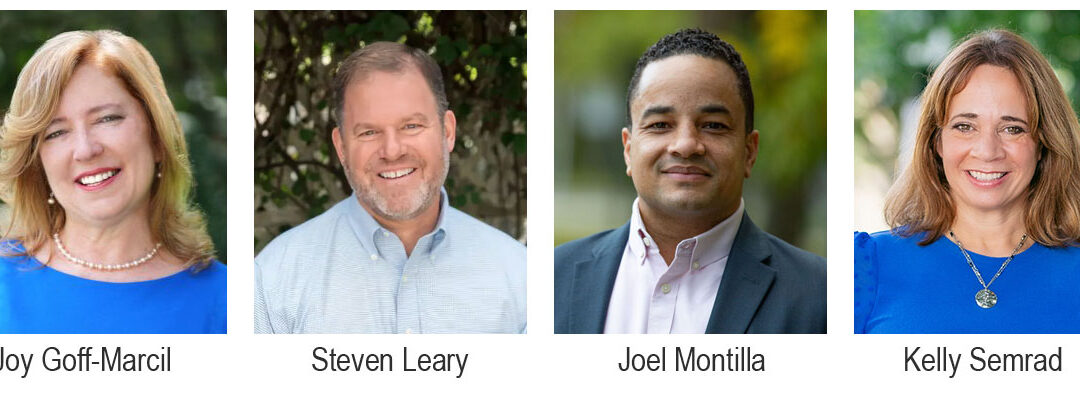
by Beth Kassab | Aug 26, 2024 | Election, News, Uncategorized, Zoning and Development
Steve Leary, with Buddy Dyer's endorsement, heads to run-off from second place
The Orlando mayor and Democrat lent his political sway to the Republican former Winter Park mayor who is running in a heavily blue Orange County Commission district. But Kelly Semrad, a UCF professor and Democrat, emerged from the primary in first place
Aug. 26, 2024
By Beth Kassab
Steve Leary, the former Winter Park mayor and Republican who outraised his opponents in the District 5 Orange County Commission race by more than 3 to 1 and touted the endorsement of one of the region’s most powerful Democrats in Orlando Mayor Buddy Dyer, is now heading into the Nov. 5 run-off from a distant second place.
Leary finished the Aug. 20 primary with 32% of the vote, 2,800 votes and 9 percentage points behind Kelly Semrad (41%), a Democrat and UCF professor who centered her campaign on how to protect rural lands from development and calls to spend the lucrative Tourist Development Tax on services and quality-of-life projects for residents vs. expenses backed by the tourism industry.
The gulf between Leary’s fundraising haul — nearly $200,000 — and Semrad’s $60,000 is stark. And political action committees such as Dyer’s Orlando PAC and the Realtor’s spent even more on Leary’s behalf.
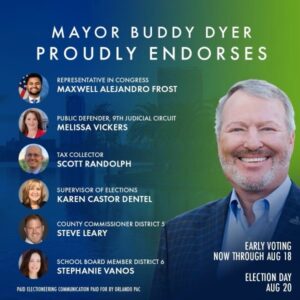
A campaign ad paid for by Orlando PAC shows Orlando Mayor Buddy Dyer’s endorsements.
A mailer just before the primary from Dyer’s PAC showcased Leary amid a slate of Democrats endorsed by the popular Orlando mayor who was first elected more than 20 years ago. The card also named U.S. Rep. Maxwell Frost, Public defender candidate Melissa Vickers, Tax Collector Scott Randolph, Supervisor of Elections candidate Karen Castor Dentel and School Board candidate Stephanie Vanos.
A separate mass text message to voters from Dyer said the people on his list “lead with integrity and are committed to fighting for Orange County residents’ quality of life.”
Leary, who received campaign contributions from a number of development and tourism interests, was the only candidate on that line-up also touted by the local Republican Party and the only one who did not emerge in first place after last week’s election (except for Castor Dentel after the supervisor’s contest was pushed to November because of a court challenge).
Semrad won 35 of the 50 precincts in the district that runs from downtown Orlando through Winter Park and Maitland to Bithlo and Christmas at the eastern edges of the county’s border. One precinct showed an exact tie.
Of the 14 precincts won by Leary, which were centered in Maitland and Winter Park, he won seven by 10 or fewer votes.
The district has more than 145,000 voters with about 55,000 Democrats, 45,000 Republicans and 45,000 people who are registered without a party affiliation or major party.
Joy Goff-Marcil (who won 16% of the vote), also a Democrat, and Joel Antonio Montilla (who won 12%), also a Republican, were eliminated from the contest to fill the seat left open by Commissioner Emily Bonilla, who has reached term limits.
“We knocked on 17,134 doors,” Semrad, 47, said. “Our goal was the Top 2. We were surprised to finish so far out front as we were out funded on the books and we were way out funded in PAC [Political Action Committee] contributions.”
Samuel Vilchez Santiago, the chairman of Orange County Democratic Executive Committee, said his group sent out texts and mailers alerting voters that Leary is a Republican, not a Democrat. He said the messages were not in response to Dyer’s endorsement, but to educate voters.
“The election last Tuesday showed that money cannot buy people’s votes,” Santiago said, pointing also to the District 1 Commission race, where Nicole Wilson, a Democrat, was far outraised by Republican Austin Arthur. They are also heading into a runoff after primary results showed she led by just two votes.
Leary, 57, whose campaign said he was unavailable to be interviewed for this story, announced Dyer’s endorsement in a June news release.
“I have had the pleasure of collaborating with Steve Leary for over 10 years during his tenure as Winter Park Mayor and Commissioner,” Dyer said in the release. “He is bright, thoughtful, and an effective leader. His experience, vision, and collaborative approach will greatly benefit all residents of District 5. I proudly endorse and fully support him.”
The endorsement also comes at a critical time for Orlando’s growth plans.
On Monday, the Orlando Sentinel reported that the Church of Jesus Christ of Latter-day Saints is attempting to annex into Orlando more than 52,000 acres of mostly untouched land in southeast Orange County, where development and environmental regulations are considered more restrictive on developers.
Earlier this year, Orlando annexed some 12,000 acres of unincorporated southeast Orange County designated for a new housing development known as Sunbridge and owned by Tavistock. The real estate and investment company is known for its billionaire founder Joe Lewis and is the same company that developed Lake Nona, owns Isleworth Golf and Country Club in Windermere and other high-profile investments across the globe.
Tavistock and companies affiliated with the church that operate its vast Deseret Ranch land have worked together to advocate for a controversial road through Split Oak Forest. The road would serve as a connector between the new developments and Osceola County.
The annexations have triggered a power struggle between Orlando and Orange County over the future of giant swaths of land and environmentalists have cried foul over what they see as the negative consequences of sprawl.
Orange County Mayor Jerry Demings’ commission this summer added two questions to the November ballot that, if approved by voters, would protect Orange’s rural boundary as well as give the county veto power over such annexations.
Dyer and other local mayors signed a letter to Demings opposing the annexation question, saying it violates “home rule” for cities. Winter Park Mayor Sheila DeCiccio did not sign the letter.
Dyer’s spokeswoman said she would need to speak to him directly about why he endorsed Leary and whether the decision is related to the annexation issue. She did not respond to a follow-up question.
Semrad is one of the most vocal advocates for strengthening the county’s control over annexations and the rural boundary, even initiating the ballot questions last year — though the Legislature intervened and only the County Commission had authority to put the questions on the ballot for approval.
Leary has stated he supports the question about the rural boundary.
But Semrad said the rural boundary question itself doesn’t have any teeth. The second question on the annexation veto power is what would give the county the power to ensure environmental and development regulations are followed.
“Annexing into the city has been a loophole to make quick cash, contribute to sprawl and pay less for environmental devastation,” she said.
Leary’s campaign website touts endorsements from Republicans such as former Congressman John Mica and former Florida House Speaker Dean Cannon as well as Edgewood Mayor and campaign consultant John Dowless. Other Democrats have also lent their support, such as Craig Russell, elected earlier this year as the first Black commissioner in Winter Park in more than 100 years, and Gary and Victoria Siplin, who served in the state Senate and Orange County Commission, respectively.
Semrad boasts endorsements from Frost, Randolph, Bonilla, state Rep. Anna Eskamani and incoming state Sen. Carlos Guillermo Smith among others.
WinterParkVoiceEditor@gmail.com
To comment or read comments from others, click here →
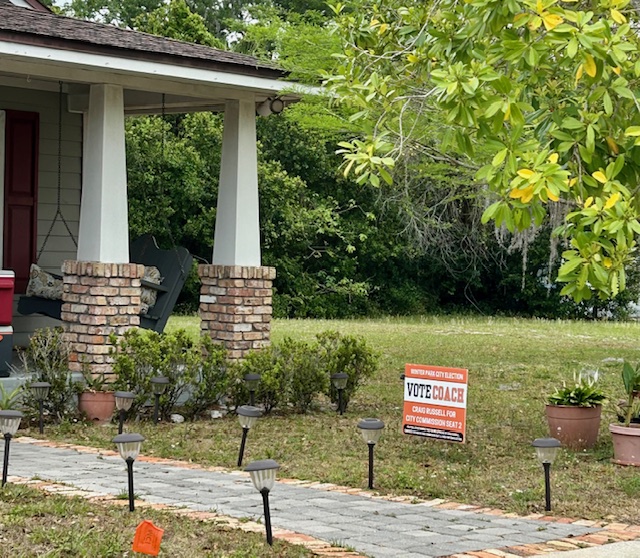
by Beth Kassab | Aug 17, 2024 | Election, News
How to recycle your campaign yard signs
After the Tuesday primary you can do your part to keep plastic signs out of the landfill
Aug. 17, 2024
By Beth Kassab
Winter Park officials are encouraging residents to recycle yard signs after Tuesday’s primary election.
The city, which typically ranks among the highest voter turnout in the region, is a hotbed for campaigning and signs spring up like hydrilla on the chain of lakes shoreline.
After the 2022 election season, the city recycled thousands of signs in partnership with Orlando, Orange County and the League of Women Voters, sparing the landfill from nearly 6 tons of additional bulk, according to a Winter Park news release.
The recycling effort transports the waste to NuCycle Energy, which converts the signs to cubes that can be used to generate energy.
“This recycling initiative will prevent an abundance of yard signs from going to a local landfill,” the release stated. “Most political signs are made from No. 5 plastic (polypropylene), a common plastic found in hundreds of household and commercial products, such as a yogurt container.”
To recycle your signs, drop them off between Wednesday, Aug. 21 at noon and Sunday, Sept. 1 at noon at one of the following locations:
• Cady Way Pool at 2529 Cady Way
• Mead Botanical Garden Community Garden at 1310 S. Denning Drive
• Fire Station 64 at 1439 Howell Branch Road
• For additional locations access cityofwinterpark.org/waste
WinterParkVoiceEditor@gmail.com
To comment or read comments from others, click here →

by Beth Kassab | Jul 25, 2024 | Election, News, Uncategorized
Let us hear your questions for County Commission District 5 candidates
The four candidates for the seat that represents Winter Park will appear at a public forum on Aug. 6
July 24, 2024
Staff Report
Voters will have the chance to hear directly from Orange County Commission candidates for District 5, which represents Winter Park, at a public forum on Aug. 6 at Westminster Winter Park.
The event at 7 p.m. is sponsored by the Orange County League of Women Voters and will be moderated by Winter Park Voice Editor Beth Kassab. Doors will open at 6:30 p.m. at Westminster, 1111 S. Lakemont Ave.
The public can also tune in live to watch the forum or watch a recorded broadcast on the League’s Facebook page. 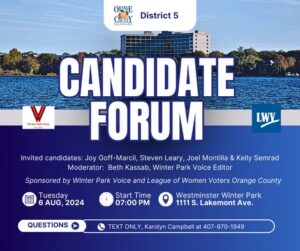
What questions do you have for the candidates who will be on the Aug. 20 ballot? You can leave them in the comment section below or email WinterParkVoiceEditor@gmail.com.
Vying for the technically non-partisan seat are: Former Maitland City Council member and former legislator Joy Goff-Marcil; former Winter Park Mayor Steve Leary; attorney Joel Antonio Montilla and Kelly Semrad, a UCF associate professor of tourism economics.
Key issues in the race include how to spend the county’s Tourist Development Tax, a levy on hotel beds; how to protect rural lands; policies for improving the region’s overcrowded roads and other transportation woes and more.
The winner will replace Emily Bonilla, who has reached term limits for her seat.
If none of the four candidates receives 50% plus one of the vote in August, then the top two vote getters will face off in November.
What else is on your Aug. 20 ballot? Take a look here.
Requests to cast a mail ballot must be made by Aug. 8 at 5 p.m.
The Orange County Supervisor of Elections office reported that it has received more than 90,000 requests for mail-in ballots so far. That is below the 214,555 requests for the primary in 2020 and 195,935 in 2022.
The lagging number this year is the result of a change in state law by the Florida Legislature, which now says that vote-by-mail requests expire after each federal election cycle and voters must re-submit those requests.
WinterParkVoiceEditor@gmail.com
To comment or read comments from others, click here →










Recent Comments